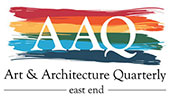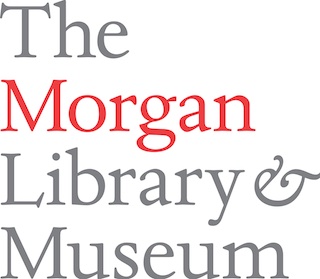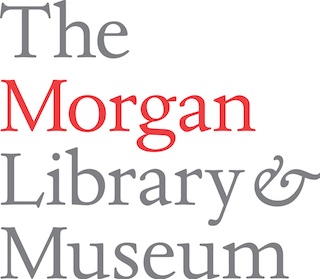~~~~~~~~~~~~~~~~~~~~~~~~~~~~~~~~~~~~~~~~~
ANDY WARHOL’S CAREER AS A BOOK ARTIST
EXHIBIT CLOSED
Warhol By The Book
February 5 / May 15, 2016
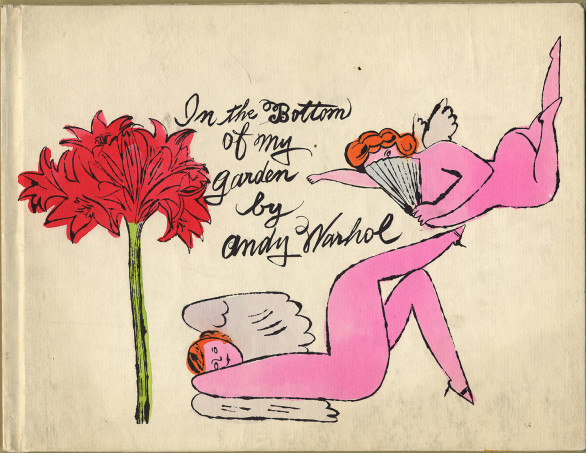 Andy Warhol (1928–1987), In the Bottom of My Garden, New York, ca. 1956. The Andy Warhol Museum, Pittsburgh, Contribution the Andy Warhol Foundation for the Visual Arts, Inc. © 2016 The Andy Warhol Foundation for the Visual Arts, Inc. / Artists Rights Society (ARS), New York.
Andy Warhol (1928–1987), In the Bottom of My Garden, New York, ca. 1956. The Andy Warhol Museum, Pittsburgh, Contribution the Andy Warhol Foundation for the Visual Arts, Inc. © 2016 The Andy Warhol Foundation for the Visual Arts, Inc. / Artists Rights Society (ARS), New York.
Warhol By The Book
Andy Warhol’s fascination with publishing and the art of the book was lifelong—rooted in his artistic training as a college student and early career in advertising, fashion, and commercial illustration. For close to forty years, books were a touchstone for Warhol—a medium to which he returned again and again as a platform for his unparalleled creativity. He contributed to more than eighty projects for books and left traces behind of dozens of others that were never realized.
Beginning on February 5, 2016, the Morgan Library & Museum will feature for the first time in New York an exhibition devoted solely to Warhol’s career as a book artist. This retrospective, which originated at the Andy Warhol Museum, Pittsburgh, features more than 130 objects dating from the artist’s student days, his early years in New York as a commercial artist and self-publisher, and the innovative work of the 1960s, ‘70s, and ‘80s that solidified Warhol’s standing in the history of modern art. Items on display include the only surviving book project from the 1940s; drawings, screen prints, photographs, self-published books, children’s books, photography books, text-based books, unique books, archival material; and his much-sought-after dust jacket designs. Warhol by the Book will remain on view through May 15.
“The Morgan is noted for its dual interests in art and literature and Warhol by the Book offers the opportunity to see the artist’s singular and creative engagement in the book arts,” said Colin B. Bailey, director of the Morgan. “His approach to the book was first and foremost a visual one and he incorporated his interests in illustration, painting, drawing, photography, and film in his designs. The Morgan is delighted to collaborate with the Andy Warhol Museum in bringing this landmark exhibition to New York.”
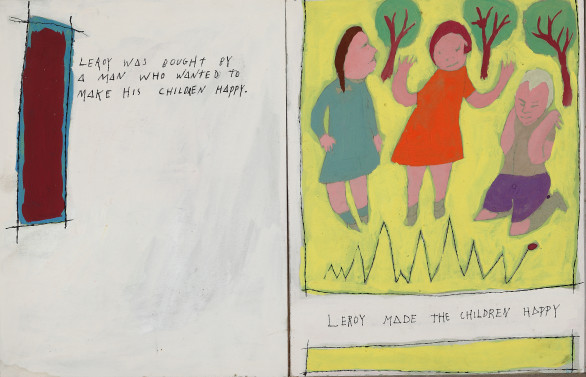 Andy Warhol (1928–1987), Leroy the Mexican Jumping Bean [unrealized], 1948–1949, Text by Philip Pearlstein (b. 1924), Ink, tempera, and graphite on board. The Andy Warhol Museum, Pittsburgh; Founding Collection. © 2016 The Andy Warhol Foundation for the Visual Arts, Inc./ Artists Rights Society (ARS), New York.
Andy Warhol (1928–1987), Leroy the Mexican Jumping Bean [unrealized], 1948–1949, Text by Philip Pearlstein (b. 1924), Ink, tempera, and graphite on board. The Andy Warhol Museum, Pittsburgh; Founding Collection. © 2016 The Andy Warhol Foundation for the Visual Arts, Inc./ Artists Rights Society (ARS), New York.
THE EXHIBITION
A reporter once suggested to Warhol that the meaning of his art was on the surface of his works. He readily agreed. Warhol by the Book explores the artist’s engagement with a medium that has no single surface. Books were always an extension of Warhol’s multi-media practice. His persistent inventiveness in this arena affords another perspective on the full breadth of a career traditionally bifurcated into commercial art and fine art. Works on view in the exhibition—many of which have rarely, if ever, been seen—are drawn primarily from the extraordinary collection of the Andy Warhol Museum, Pittsburgh. Additional items are drawn from the Williams College Museum of Art, Williamstown, Massachusetts, the Morgan’s collection, and private and institutional lenders.
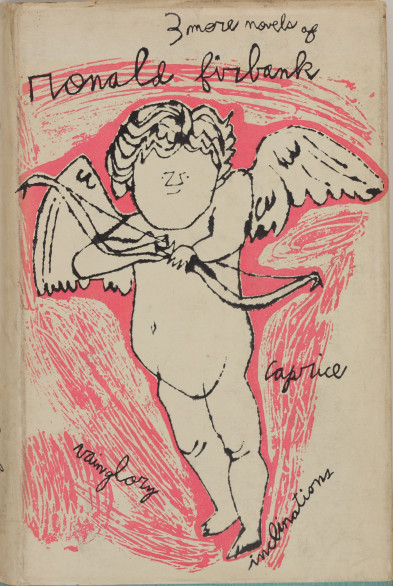 Andy Warhol (1928–1987), Three More Novels of Ronald Firbank: Vainglory; Inclinations; Caprice by Ronald Firbank, New York: New Directions, 1951. The Andy Warhol Museum, Pittsburgh; Museum Purchase. © 2016 The Andy Warhol Foundation for the Visual Arts, Inc./ Artists Rights Society (ARS), New York.
Andy Warhol (1928–1987), Three More Novels of Ronald Firbank: Vainglory; Inclinations; Caprice by Ronald Firbank, New York: New Directions, 1951. The Andy Warhol Museum, Pittsburgh; Museum Purchase. © 2016 The Andy Warhol Foundation for the Visual Arts, Inc./ Artists Rights Society (ARS), New York.
I. College and Commercial Art
Andy Warhol was born in 1928, the son of Slovakian immigrants. Perhaps inspired by his mother, Warhol showed an interest in drawing at an early age and majored in pictorial design at the Carnegie Institute of Technology. College textbooks and other artifacts of Warhol’s youth will be shown in the exhibition in tandem with some of the surviving drawings from the 1940s, including an unfinished children’s book about a Mexican jumping bean, created in collaboration with the painter Philip Pearlstein.
After graduating in 1949, Warhol moved to New York and achieved success as a graphic artist in advertising, fashion illustration, and commercial publishing. Origins of the radical ideas Warhol would explore with greater virtuosity as a fine artist are present in this early work, including his appropriation of existing imagery and the use of seriality. Warhol’s signature style as a commercial artist employed a blotted-line drawing technique, a delightful repertoire of chubby angels and fairies, and hand-lettering that reproduced his mother’s eccentric handwriting. He used photography and print as sources for his illustrations, just as he would continue to do for the rest of his career. A number of his early commissioned book covers will be displayed in the exhibition alongside drawings of rejected designs.
II. Books of Friendship
From 1953 to 1960, at the same time he was creating dust jacket designs for major publishers, Warhol embarked on self-publishing ventures to create and distribute illustrated books. They were issued in small editions of one hundred or so copies. Most of them were collaborations with minor writers who were close friends and with whom Warhol was infatuated. In early works such as A Is an Alphabet and the rarely-seen Love Is a Pink Cake, both to be displayed, the correlation between words and images is often obscure, as if the books were expressions of a secret language between two friends. Warhol favored calligraphy in place of typography to make his friends’ writing an extension of his graphic style. He gave these books away to friends and used them to promote his graphic talents to business associates in the commercial art world—a duality that makes his self-published books difficult to assign to any traditional genre. He exhibited them with preliminary drawings at small galleries and a favorite hangout, the café Serendipity 3, on New York’s Upper East Side. Warhol’s early efforts to infiltrate the mainstream art world, however, proved sporadic and unsuccessful.
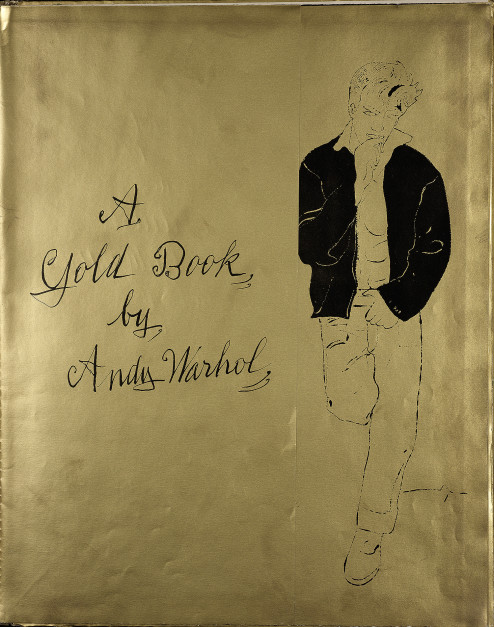
Andy Warhol, A Gold Book [New York: the artist, 1957], Williams College Museum of Art; Gift of Richard Holmes, Class of 1946. © 2016 The Andy Warhol Foundation for the Visual Arts, Inc./ Artists Rights Society (ARS), New York.
Warhol’s hand-colored books of the 1950s, such as 25 Cats Name Sam and One Blue Pussy, the satiric cookbook Wild Raspberries, and In the Bottom of My Garden, are infused with a sense of frivolity. He derived his witty, sometimes erotic, figures from imagery in famous illustrated books. Two sources Warhol used were Les fleurs animées (1847) by J.J. Grandville and the saccharine flower fairies of early 20th-century artist Cicely Mary Barker. Another source for Warhol was Jacques Stella’s figures in Les jeux et plaisirs de l’enfance (1657)—a popular engraved book of its time, which was itself modeled on a predecessor. In all these publications, Warhol favored variations in composition. No two books are alike. He enlisted his friends to apply the finishing touches, reflecting an increasing interest in collective bookmaking that would be a hallmark of Warhol’s work in the Pop era.
Warhol left many book projects unfinished. Examples of these highlighted in the exhibition are children’s projects such as The House That Went to Town, There Was Snow in the Street and Rain in the Sky, and So, as well works aimed at older audiences such as Horoscopes for the Cocktail Hour and The Boy Book. The show features a number of unique and one-of-a-kind books, many of which relate to the subjects of Warhol’s simultaneous explorations in painting and photography. Notable is a sketchbook of lips fragmented from his commissioned portraits of women. One of the centerpieces of the exhibition is the recently-discovered maquette for a 30-foot-long accordion-fold book created by cutting up Warhol’s iconic series of Marilyn Monroe screen prints.
III. Artist / Author / Icon
Is Andy Warhol the Hemingway of our generation? Defining our sexuality, refining our vocabulary? —The Village Voice (1967)
Warhol’s reputation in the early 1960s changed from that of a successful commercial artist to a so-called fine artist associated with the Pop art movement. As he became ever more influential his book designs would move away from the personal qualities and commercial art techniques that made his early work so notable. The majority of his publications after 1964 reflect his concurrent interests in painting, printmaking, photography, and film. He also published a book of philosophy, a memoir, and left behind a bestselling diary. Warhol no longer had to rely on self-publishing to make and distribute his books. A celebrity in his own right, he was under contract to major publishers for the rest of his life.
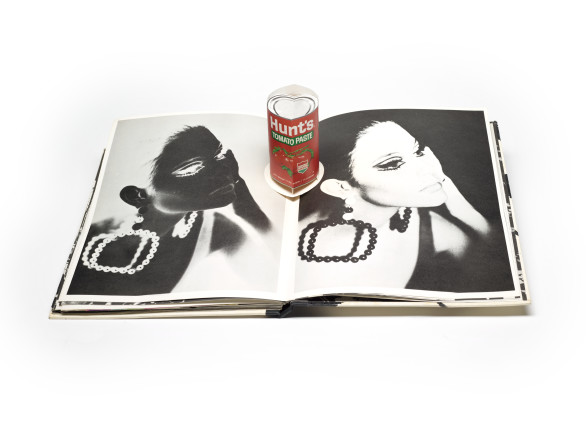
Andy Warhol, Andy Warhol’s Index (Book), New York: Random House; A Black Star book, 1967. The Morgan Library & Museum; Purchased on the Gordon N. Ray Fund. Photography by Graham S. Haber, 2015. © 2016 The Andy Warhol Foundation for the Visual Arts, Inc./ Artists Rights Society (ARS), New York.
Andy Warhol’s Index (Book)—his most famous publication of the Pop era—is the first, and arguably only, mass-market artist’s publication. Archival correspondence from Random House and preliminary mock-ups afford a glimpse into Warhol’s world of the late 1960s. The multi- sensory book was intended to be a “total experience.” High-contrast photographs of Warhol’s superstars and members of the Velvet Underground were paired with unconventional elements, including a flexi-disc recording, disappearing ink, and a three-dimensional object tied to the book with a string—resulting in a game-changing artist’s book cited by one editor as being as important to the future of publishing as Gutenberg’s invention of movable type.
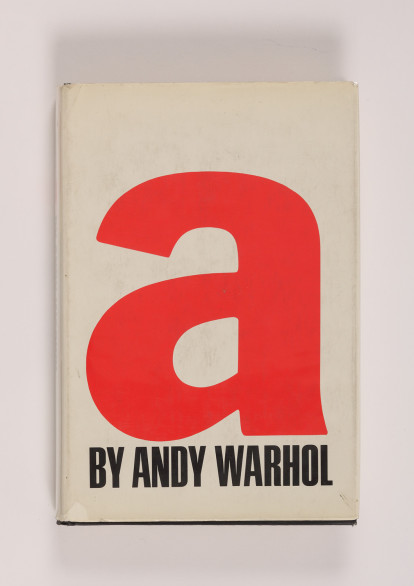
Andy Warhol (1928–1987), A: A Novel, 1968. The Andy Warhol Museum, Pittsburgh. © 2016 The Andy Warhol Foundation for the Visual Arts, Inc. / Artists Rights Society (ARS), New York.
Other publications from the Pop era featured in the exhibition include Warhol’s colorful screen prints of Jackie O. and JFK in Flash—November 22, 1963 and his novel a, which used a cassette recorder (also in the exhibition) to document a day in the life of his superstar Ondine.
The final phases of Warhol’s career as a book artist focused on photography and writing: The Philosophy of Andy Warhol, Andy Warhol’s Exposures, America, and his posthumously-published diaries. Warhol continued to rely on tape recordings, editorial intervention, and the ghostwriting of his associates for all these publications, many of which focused on celebrity nightlife. In Exposures, Warhol glibly voiced his approach to Manhattan’s social scene: “I will go to the opening of anything, including a toilet seat.” America encompassed broader subjects, including his opinions about the nation’s poverty, wealth, and ecology—perceptions gleaned from his intermittent travels around the country. During his final years, Warhol used his large screen prints as the basis for dust jacket designs. One of the last publications in the exhibition, Andy Warhol’s Children’s Book, returns full circle to the genre that first drew his attention as a young artist.
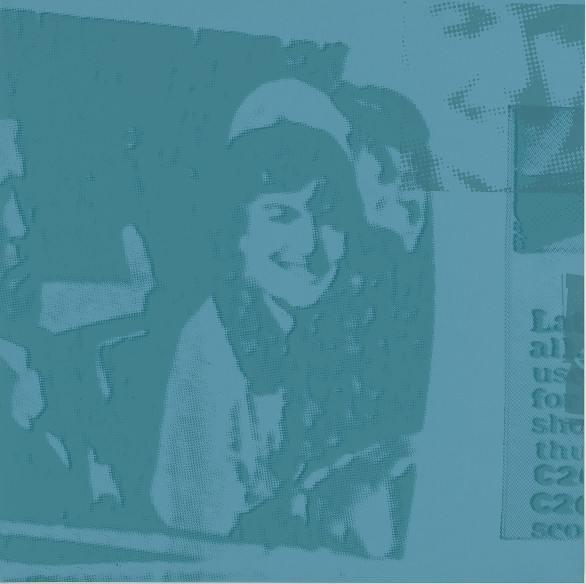
Andy Warhol, Flash – November 22, 1963, Briarcliff Manor, NY: Racolin Press, 1968). Spencer Collection, The New York Public Library, Astor, Lenox and Tilden Foundations. © 2016 The Andy Warhol Foundation for the Visual Arts, Inc./ Artists Rights Society (ARS), New York.
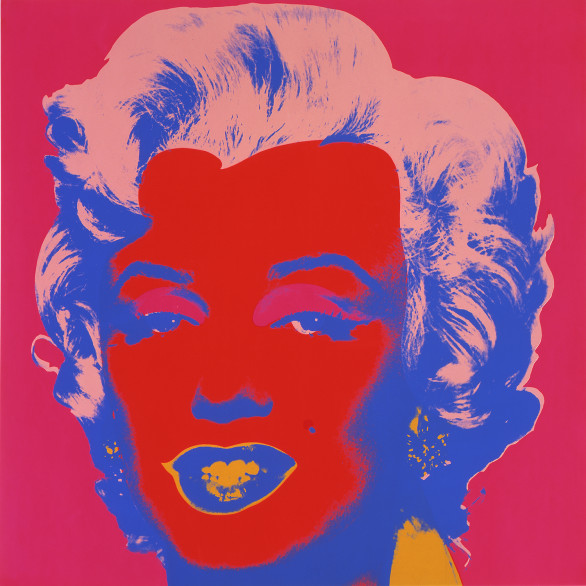
Andy Warhol, Print from Marilyn Monroe, Screen print on paper. The Andy Warhol Museum, Pittsburgh; Museum Loan, Private Collection. © 2016 The Andy Warhol Foundation for the Visual Arts, Inc./ Artists Rights Society (ARS), New York.
——————————————————-
PUBLIC PROGRAMS
~~~~~~~~~~
LECTURE
Warhol’s Books / Warhol’s World
Blake Gopnik and Lucy Mulroney
Join us as we kick off the exhibition Warhol by the Book with an opening night discussion about Andy Warhol featuring Blake Gopnik, art critic and author of the highly-anticipated biography of Warhol, and Lucy Mulroney, art historian and Senior Director for the Special Collections Research Center, Syracuse University.
The exhibition Warhol by the Book will open for program attendees before the event.
Friday, February 5, 6:30 pm
Tickets: Free with museum admission or for students with valid ID. Email tickets@themorgan.org to reserve.
~~~~~~~~~~~~~~~~~~~~~
FILM
Superstar: The Life and Times of Andy Warhol
Director: Chuck Workman (1990, 87 minutes)
Superstar looks at the life, work, and impact of Andy Warhol (1928– 1987), pop icon and artist, from his childhood in Pittsburgh to his death after a botched surgery. Warhol coined the word “superstar,” became one, and changed the way the culture looks at and understands celebrity. Chuck Workman interviews art dealers, critics, and celebrities such as Dennis Hopper, Ultra Violet, Tom Wolfe, Sylvia Miles, Irving Blum, Paul Warhola, Fran Lebowitz, and others to discover what was at the core of Warhol’s creativity.
The exhibition Warhol by the Book will open for program attendees before the screening.
Friday, February 12, 7 pm
Tickets: Exhibition-related films are free with museum admission. Advance reservations for Members only. Tickets are available at the Admission Desk on the day of the screening.
~~~~~~~~~~~~~~~~~~~~~
GALLERY TALK
Warhol by the Book
Sheelagh Bevan, Andrew W. Mellon Assistant Curator, Printed Books & Bindings
Friday, February 19, 6:30 pm
Tickets: All gallery talks and tours are free with museum admission; no tickets or reservations necessary.
~~~~~~~~~~~~~~~~~~~~~
LECTURE
A Was Not an Apple: Andy Warhol’s Alphabet Books
Nina Schleif
Andy Warhol first ventured into the world of publishing in the 1950s with his self-published promotional books. In these early collaborative projects, Warhol experimented with the artistic principles that would later become the mark of his Pop Art: seriality, mass production, innovative use of color and, presumably, highly consumable images. Nina Schleif, recent Terra Foundation Senior Fellow, Smithsonian American Art Museum, and editor and co-author of the ground-breaking
catalog Reading Andy Warhol, will share her research on the early promotional booklet A Is an Alphabet (1953) and the unpublished manuscript The Ladies’ Alphabet, discussing their genesis, photographic sources, and the wider cultural context in which they were created.
The exhibition Warhol by the Book will open at 5:30 pm for program attendees.
Thursday, March 17, 6:30 pm
Tickets: $15; $10 for members; free for students with valid ID.
~~~~~~~~~~~~~~~~~~~~~
LECTURE
The Two Warhols
Thomas Crow
Warhol by the Book offers a clarifying look at the transition between Andy Warhol’s first career as a successful illustrator in print media and his second, storied career as a fine artist. Thomas Crow, Rosalie Solow Professor of Modern Art & Associate Provost for the Arts, New York University’s Institute of Fine Art, says it needs to be asked why Warhol would have abandoned the first for the second, when his prospects for success in the gallery world were far from assured at the point around 1960 when he decided to re-invent himself. What did he retain and what did he discard in moving from one identity to another?
The exhibition Warhol by the Book will open at 5:30 pm for program attendees.
Tuesday, March 29, 6:30 pm
Tickets: $15; $10 for members; free for students with valid ID.
~~~~~~~~~~~~~~~~~~~~~
DRAMATIC PERFORMANCE
The 2016 Kenneth A. Lohf Poetry Reading: Ron Padgett
Since the mid-1960s, Ron Padgett has played a significant role in modern poetry through his imaginative works as a poet, educator, and translator. His many collections include Alone and Not
Alone (2015), Collected Poems (2013), andHow Long (2011), which was a finalist for the Pulitzer Prize.
Please join us for this inaugural reading in a series honoring Kenneth A. Lohf (1925–2002)—a literary scholar, rare book librarian, and longtime member of the Morgan’s Council of Fellows. Lohf bequeathed to the Morgan his extensive collection of books and manuscripts by English poets. The program will take place in Pierpont Morgan’s Library and is followed by a reception.
The exhibition Warhol by the Book will open at 5:30 pm for program attendees.
Thursday, April 21, 6:30 pm
Tickets: $15; $10 for members. Limited ticket availability.
~~~~~~~~~~~~~~~~~~~~~
GALLERY TALK
Warhol by the Book
Sheelagh Bevan, Andrew W. Mellon Assistant Curator, Printed Books & Bindings
Friday, April 29, 1 pm
Tickets: All gallery talks and tours are free with museum admission; no tickets or reservations necessary.
~~~~~~~~~~~~~~~~~~~~~
Organization and Sponsorship
Warhol by the Book is organized by the Andy Warhol Museum, Pittsburgh, in collaboration with the Morgan Library & Museum. The New York presentation is organized by Sheelagh Bevan, Andrew W. Mellon Assistant Curator, Department of Printed Books & Bindings, the Morgan Library & Museum.
Lead funding for the exhibition at the Morgan is generously provided by Karen H. Bechtel.
The programs of the Morgan Library & Museum are made possible with public funds from the New York City Department of Cultural Affairs in partnership with the City Council, and by the New York State Council on the Arts with the support of Governor Andrew Cuomo and the New York State Legislature.
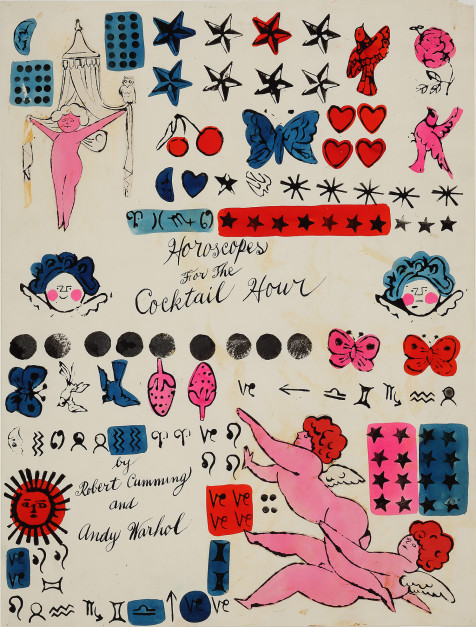
Andy Warhol, Horoscopes for the Cocktail Hour [unrealized], ca. 1961, Text by Robert Cumming, Ink, stamped ink, Dr. Martin’s aniline dye, and collage on sketchbook paper. The Andy Warhol Museum, Pittsburgh; Founding Collection, Contribution The Andy Warhol Foundation for the Visual Arts, Inc.
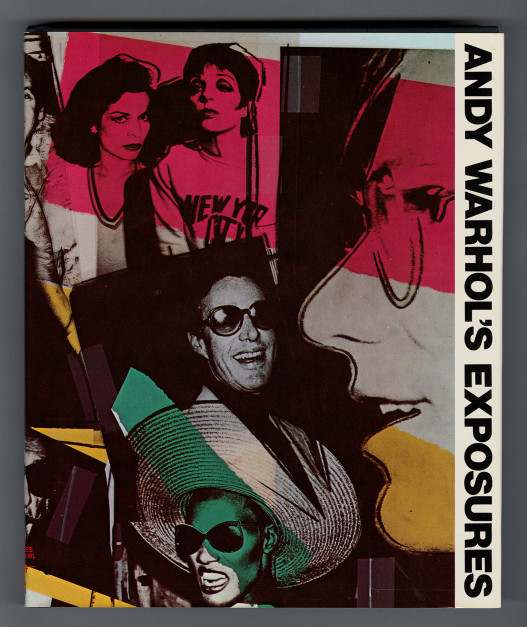
Andy Warhol, Andy Warhol’s Exposures, First Printing, 1979, The Andy Warhol Museum, Pittsburgh. © 2016 The Andy Warhol Foundation for the Visual Arts, Inc. / Artists Rights Society (ARS), New York.
~~~~~~~~~~~~~~~~~~~~~~~~~~~~~~~
The Morgan Library & Museum began as the private library of financier Pierpont Morgan (1837– 1913), one of the preeminent art collectors and cultural benefactors in the United States. Today, more than a century after its founding in 1906, the Morgan serves as a museum, independent research library, music venue, architectural landmark, and historic site. In October 2010, the Morgan completed the first-ever restoration of its original McKim building, Pierpont Morgan’s private library, and the core of the institution. In tandem with the 2006 expansion project by architect Renzo Piano, the Morgan now provides visitors unprecedented access to its world- renowned collections of drawings, literary and historical manuscripts, musical scores, medieval and Renaissance manuscripts, printed books, photography, and ancient Near Eastern seals and tablets.
General Information
The Morgan Library & Museum
225 Madison Avenue, at 36th Street, New York, NY 10016-3405 212.685.0008
www.themorgan.org
Just a short walk from Grand Central and Penn Station
Hours
Tuesday–Thursday, 10:30 a.m. to 5 p.m.; extended Friday hours, 10:30 a.m. to 9 p.m.; Saturday, 10 a.m. to 6 p.m.; Sunday, 11 a.m. to 6 p.m.; closed Mondays, Thanksgiving Day, Christmas Day, and New Year’s Day. The Morgan closes at 4 p.m. on Christmas Eve and New Year’s Eve. The Morgan is open on select Holiday Mondays, including President’s Day.
Admission
$18 for adults; $12 for students, seniors (65 and over), and children (under 16); free to members and children 12 and under accompanied by an adult. Admission is free on Fridays from 7 to 9 p.m. Admission is not required to visit the Morgan Shop, Café, or Dining Room.
__________________________________________________
